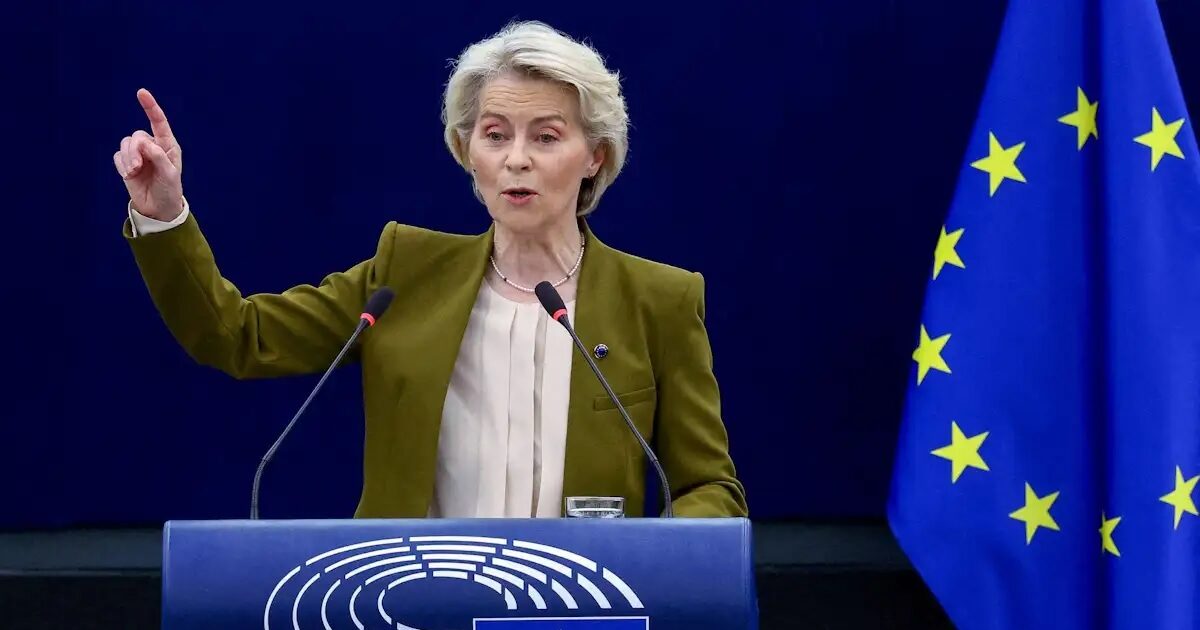To relax his reform budget of the European Union (EU) and especially in the part that concerns farmers, to prevent a rebellion in the European Parliament intends the President of the Commission, Ursula von der Leyen.
In a meeting he had on Monday (10.11.2025) with the president of the Parliament, Roberta Metzola, and the current president of the European Council, Mette Frederiksen, he promised to pay more attention to the interests of regional governments, farmers and MEPs. At the meeting, the goals were “clarified and reinforced” on three points, von der Leyen announced on the online platform X. They now have a “clear path,” she said, adding that she looked forward to the budget debate in parliament on Wednesday, according to a Handelsblatt report.
In July, the President of the Commission presented a fundamental reform of the multiannual financial framework (2028 to 2034). Instead of devoting two-thirds of the total budget to agricultural and structural aid as before, the majority will in future be channeled to EU capitals through 27 national schemes.
Compromise proposal to the European Parliament
The idea is that governments should be able to decide more flexibly on the use of resources and align more closely with current EU priorities. For example, they could decide to spend less on agriculture and more on defence.
However, the reform plans caused an uproar in the European Parliament. In a joint letter, the four parliamentary groups – Christian Democrats, Social Democrats, Liberals and Greens – recently threatened to reject the draft law if it is not amended. They are particularly critical of the planned cuts to the agricultural and structural funds. They also fear the involvement of the European Parliament and regional governments.
In a compromise document obtained by Handelsblatt, von der Leyen now proposes several changes to the reform package.
The Commission had already committed to allocating €300 billion in direct payments to farmers out of a total budget of €2 trillion in the draft law. In addition, governments should now allocate at least ten percent of their national budgets to agriculture. Regional administrations, such as the federal states in Germany, should be fully involved in the preparation, implementation and evaluation of national plans. They should continue to be able to exchange information directly with the Commission and not have to go to the federal government. A ‘Steering Group’, made up of the Commission, the Council and the Parliament, will set the EU’s strategic priorities each year before the annual EU budget is drawn up. This will allow the European Parliament to influence the areas where funds will be allocated.
The changes were welcomed in the European Parliament. The President of the Commission had implemented the three crucial points, according to the leadership of the European People’s Party (EPP): more agricultural funds, structural funds and a stronger role for Parliament.
Green Party budget expert Rasmus Andresen also said the proposals were a step in the right direction. “But more is needed, especially in terms of the involvement of Parliament.” The Coordinating Group should not become a “paper tiger”. Parliament needs “co-decision rights” in national plans. SPD budget expert Jens Geier said it was commendable that the Commission was taking a step towards Parliament. But he was still not satisfied with the offer.
EU countries are also critical of the reform.
Similar reservations exist in the Council of Member States as in the Parliament. A large group of countries, the so-called “Friends of Cohesion”, want to ensure that regional funding is not cut. The farmers’ lobby also exerts considerable influence in many capitals.
The Commission’s compromise proposal is “sensible”, an EU diplomat said. It contains many elements that are also being discussed in the Council of Member States. It is also good that Parliament makes its objections known early. “Ideas on agriculture and regional development are similar in the Parliament and the Council,” said the diplomat.
The Danish Presidency of the Council aims to reconcile the various demands and present a negotiating position for the Council by the end of the year. The Commission would like to complete negotiations on the multiannual financial framework by the end of 2026. However, diplomats expect talks to continue into 2027. In the past, agreement was usually reached just days before the new financial framework came into force.
